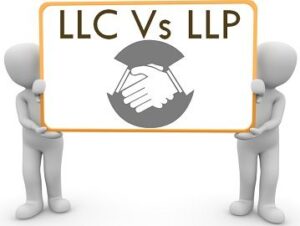LLP vs LLC


Limited Liability Partnerships (LLPs) and Limited Liability Companies (LLCs) are both popular business structures.
That offer limited liability protection to their owners.
However, there are some key differences between the two entities, including:
1.Ownership and Management:
- LLP: In an LLP, partners have an active role in the management and operation of the business. Partnerships typically govern Through a partnership agreement that outlines each partner’s rights, responsibilities and share of profits and losses.
- LLC: In an LLC, owners are called members, and they have more flexibility in structuring management and decision-making processes. LLCs can be member-managed, where all members participate in management, or manager-managed, where management is delegated to appointed managers.
2.Liability Protection:
- LLP: LLPs provide limited liability protection to partners, shielding their personal assets from business debts and liabilities incurred by the partnership.
However, partners may still be personally liable for their own professional misconduct or negligence.
- LLC: Like LLPs, LLCs offer limited liability protection to members, protecting their personal assets from business liabilities.
Members are typically not personally liable for the debts and obligations of the LLC beyond their investment in the company.
3.Tax Treatment:
- LLP: LLPs treat as pass-through entities for tax purposes, meaning that profits and losses pass through to the individual partners, who report them on their personal tax returns. LLPs do not pay taxes at the entity level.
- LLC: LLCs also enjoy pass-through taxation by default, but they have the option to elect corporate taxation if desired.
- LLC members report their share of profits and losses on their personal tax returns, regardless of whether the LLC elects to tax as a partnership or a corporation.
4.Formation Requirements:
- LLP: LLP formation requirements vary by jurisdiction but generally involve registering with the appropriate state agency and filing formation documents, such as a Certificate of Limited Liability Partnership.
- LLC: LLC formation requirements also vary by state but typically involve filing Articles of Organization with the state and drafting an Operating Agreement to govern the company’s operations.
5.Business Purpose:
- LLP: LLPs are commonly used by professional service providers such as lawyers, accountants, and architects, who wish to operate as a partnership while enjoying limited liability protection.
- LLC: LLCs are a versatile business structure suitable for a wide range of industries and purposes, including small businesses, startups, real estate ventures, and more.
In summary, LLPs and LLCs are both effective business structures that offer limited liability protection to their owners.┬Ā But they differ in terms of ownership, management, liability protection, tax treatment, formation requirements, and business purpose.
To visit: https://www.mca.gov.in/
When choosing between an LLP and an LLC, it’s essential to consider your specific business needs, goals, and preferences. Finally,┬Ā consult with legal and financial advisors to determine the best structure for your situation.
For further details access our website: https://vibrantfinserv.com
